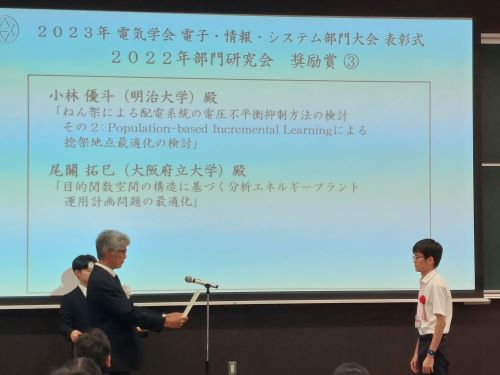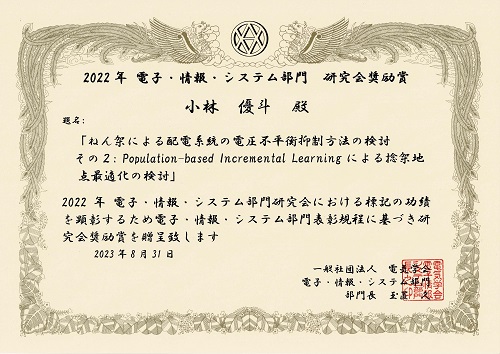[Graduate School of Advanced Mathematical Sciences] KOBAYASHI Yuto wins the Research Group Encouragement Award in the Electronics, Information, and Systems Division of the Institute of Electrical Engineers of Japan in 2022
Oct. 23, 2023


KOBAYASHI Yuto, a second-year student in the Master’s Program of the Network Design Program at the Graduate School of Advanced Mathematical Sciences (FUKUYAMA Yoshikazu Laboratory), received the Research Group Encouragement Award in the Electronics, Information, and Systems Division of the Institute of Electrical Engineers of Japan in 2022.
This award is given to young researchers not more than 35 years of age from among the papers presented at the research meetings organized by the Technical Committees of the Electronics, Information, and Systems Division of the Institute of Electrical Engineers of Japan, for their excellent papers suitable for young engineers.
Award-winning paper: KOBAYASHI Yuto, FUKUYAMA Yoshikazu, SEKI Kojiro, OI Akihiro , YOSHIDA Hotaka, JINTSUGAWA Toru, FUJIMOTO Hisashi: “Study on voltage imbalance suppression method in distribution system by transposition, part 2: study on optimization of transposition point by integer-type population-based incremental learning” Joint Research Group on Systems and Smart Facilities of the Institute of Electrical Engineers of Japan, ST-22-021,SMF-22-028, 2nd November, 2022
In the distribution system of the electric power system, the introduction of solar energy generation equipment has been advanced in the general household in recent years, and the problem of the voltage imbalance between the three phase high-voltage distribution lines has become remarkable. In order to suppress this voltage imbalance, in this paper, an optimization method of the transposition point, which changes the wiring between the three phases, was investigated. The proposed method using integer-type population-based incremental learning, which is one of the evolutionary calculation methods applied to combinatorial optimization, was applied to a distribution line model using real distribution line data, and it was confirmed that imbalance can be efficiently corrected and that the calculation time can be significantly reduced by parallel processing. This research was conducted jointly with Fuji Electric Co., Ltd.
≪Japanese version≫
This award is given to young researchers not more than 35 years of age from among the papers presented at the research meetings organized by the Technical Committees of the Electronics, Information, and Systems Division of the Institute of Electrical Engineers of Japan, for their excellent papers suitable for young engineers.
Award-winning paper: KOBAYASHI Yuto, FUKUYAMA Yoshikazu, SEKI Kojiro, OI Akihiro , YOSHIDA Hotaka, JINTSUGAWA Toru, FUJIMOTO Hisashi: “Study on voltage imbalance suppression method in distribution system by transposition, part 2: study on optimization of transposition point by integer-type population-based incremental learning” Joint Research Group on Systems and Smart Facilities of the Institute of Electrical Engineers of Japan, ST-22-021,SMF-22-028, 2nd November, 2022
In the distribution system of the electric power system, the introduction of solar energy generation equipment has been advanced in the general household in recent years, and the problem of the voltage imbalance between the three phase high-voltage distribution lines has become remarkable. In order to suppress this voltage imbalance, in this paper, an optimization method of the transposition point, which changes the wiring between the three phases, was investigated. The proposed method using integer-type population-based incremental learning, which is one of the evolutionary calculation methods applied to combinatorial optimization, was applied to a distribution line model using real distribution line data, and it was confirmed that imbalance can be efficiently corrected and that the calculation time can be significantly reduced by parallel processing. This research was conducted jointly with Fuji Electric Co., Ltd.
≪Japanese version≫
Related links


